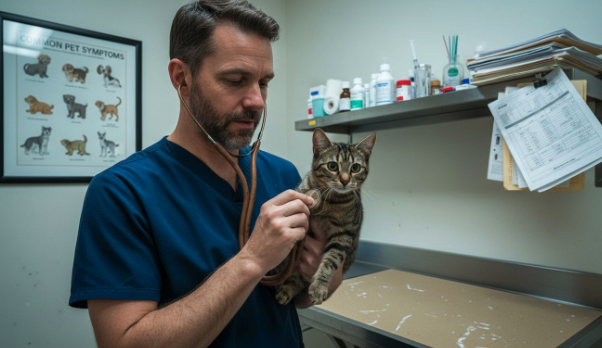We all adore dogs, and indeed, they’ve earned the title ‘man’s best friend’ for a reason, but paws and wagging tails aside, they’re just like every other pet – they need proper attention and regular veterinary visits are mandatory. Owning a dog comes with the responsibility of managing their health properly, including booking their regular vet appointments. These appointments will ensure that your furry friend lives a long and happy life. Just like us, dogs can have underlying health issues that can go unnoticed until it’s too late. Regular health check-ups can help to ensure that vaccines are kept up to date and any underlying issues are identified early on.
General Health Assessments: The Importance of Regular Check-Ups
It isn’t very common to conduct regular health checks for dogs; however, if a dog does require health assistance, they are taken to the vet, where the dog is given a more advanced exam, which helps with long-term care. Annual check-ups are essential not only to improve dogs’ hygiene, but also allow vets to conduct a thorough assessment focusing on a myriad of other body parts as well. Only then are dogs truly able to live a healthy life into old age.
For the best results, dogs should be taken to the vet at least annually so that dogs are able to live into ‘older age’ and be free from any serious health concerns down the line. With the right preventative measures, they can catch early signs of issues, making it much easier to manage in the long run.
Making Vet Visits Easier For Your Dog
Taking your dog to the vet frequently will help them feel more comfortable with the office, this in return will reduce the anxiety associated with the vet’s office over time. Dogs that only get brought to the vet’s when they are sick or injured will be unable to separate the vet’s office from negative experiences. Taking them for routine check-ups and to say hi to the vet helps build positive associations.
These visits also ensure that your dog is less stressed, making it easier to identify any hidden potential health issues, as a relaxed dog is likely to be more cooperative during examinations.
Importance of Microchipping Pets
Microchipping your dog is one of the most important things you can do as a responsible dog owner. It is also a legal requirement in some places, like the UK. A microchip allows for permanent identification that increases the odds of a lost dog being found and returned to you. The best part is that microchipping dogs is quick and painless, so it can be done during any Vet Visit. Updating your dog’s microchip information so that it is functional and keeping the contact details current adds a lot of security in emergencies.
Staying Current With Vaccinations
Keeping your dog updated with vaccinations like the ones for distemper, parvovirus, and leptospirosis is essential. These vaccinations, along with others, will be provided to you in a schedule by your vet which will be uniquely tailored to your dog’s age, lifestyle, and even where you live. Taking your dog to the vet regularly makes sure that your dog has not missed any vaccinations which helps them avoid getting sick.
If you are planning to travel with your dog, your vet can also provide additional vaccinations needed for international travel like the rabies vaccine and guide you through the complexities of ‘Pet Passport’ scheme.
Preventative Treatment For Fleas, Ticks, and Worms
Fleas, ticks, and worms fall under the bracket of parasites and can endanger your dog’s health. Scheduling regular vet appointments aids in preventive care when it comes to fleas, ticks, and other parasites, giving your dog protection all year long. As these vets deal with dogs day in and day out, they can easily suggest the best and most suitable products that fit your dog’s lifestyle.
Dealing With Behavioral Issues
Most dogs do develop behavioral issues that can be better solved when they are still pups. Be it excessive barking, chewing, or anxiety, your vet is in a good position to give advice, and can even refer you for specialist help. Annual check-ups allow you to discuss concerns that you might have pertaining to your Dog’s behavior, and receive professional advice on handling or correcting these concerns.
The Benefits of Neutering
Neutering is a procedure that is done fairly often, and has many positive health implications such as lowering the risk of some cancers, and controlling the spread of unwanted litters. Your vet is always willing to talk with you about the procedure if your dog is still unneutered, explaining the best age for neutering, and recovery expectations. Post surgery, the vet is also helpful with advising on diet and activity management to assist in smooth healing.
Dental Care: Beyond Just Fresh Breath
Maintaining a dog’s oral hygiene is an area that most pet owners tend to neglect. Dental problems not only pose risks of infections that can affect vital internal organs, but also causes a great deal of pain. During routine examinations, vets check and advise on the state of your pet’s teeth and gums, recommending cleanings and offering tips on maintaining oral hygiene between appointments. Scheduled dental check-ups can go a long way in delaying and preventing the need for more complicated procedures in the future.
Monitoring Weight and Body Condition
Obesity is a common problem faced by dogs and often results in serious health issues such as joint pain, heart problems, and diabetes. Most vets evaluate your dog’s weight in conjunction with assessing their body condition. In case your dog is found to be on the heavier side, a weight loss regimen comprising diet and exercise will be outlined by the vet. Conversely, underweight dogs may indicate underlying health issues that require assessment.
Caring for Senior Dogs
Older pets may need to be seen more frequently to keep tabs on age-related changes like arthritis and declining eyesight. Regular check-ups can help in managing these issues which in turn enhances the quality of life for your dog. Vets are also a great source of information when it comes to dietary and supplemental needs as well as lifestyle changes for Senior dogs.
Final Thoughts
Preventive healthcare begins with regular veterinary visits for your furry friend and is central to ensuring their continued wellbeing. During these visits, check-ups, vaccinations, dental hygiene, and parasite control are all done, which keeps your dog happy and healthy. These appointments also safeguard against problems by making early detection possible.
Do not delay scheduling another visit until you notice something wrong. Give your pup the present of good health by booking the next appointment today.
EXTRA:
> Are you curious about the benefits of cat ownership? Discover how a feline companion can boost your well-being, reduce stress, and add endless joy to your life in our latest blog post.
>Download our app on iOS or Android here> IOS & Android












